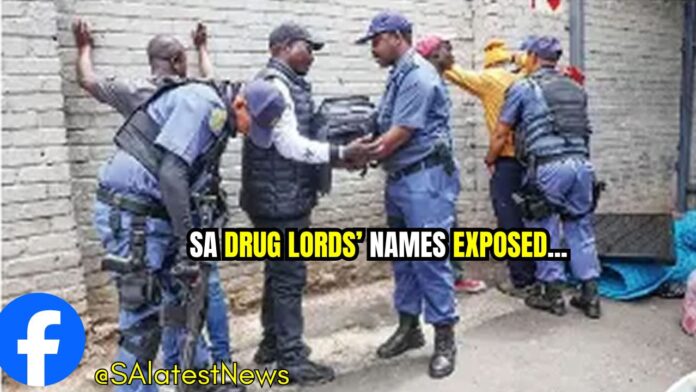Nigerian Drug Lords Dominate South Africa’s Underworld, Confidential Police Report Reveals
A confidential police intelligence report submitted to Parliament by suspended Police Minister Senzo Mchunu has laid bare the extent of South Africa’s drug trade, identifying the masterminds behind the multibillion-rand narcotics network — with Nigerian drug lords dominating operations across several provinces.
The classified document, compiled by the SAPS Crime Intelligence and Forensic Services division and presented to Mchunu in June, paints a disturbing picture of an entrenched criminal underworld. It names key figures, trafficking routes, and the syndicates’ deep-rooted infiltration of communities and official structures.
According to the report, Nigerian nationals have become the modern-day Pablo Escobars of South Africa, controlling much of the illicit cocaine, heroin, and synthetic drug trade across major cities and transport corridors.
Named Drug Kingpins Across Provinces
The report lists Stanley Egbo, Michael Ifebuche, Sunny Nwobodo, Johnson Aneke and Kingsley Chukwu as the dominant drug kingpins operating in Gauteng — South Africa’s most lucrative narcotics territory.
In the Free State, two Nigerians, identified as Uneh Umeh and Uneh Ukuruibe, are named as the top drug czars.
The North West province has five profiled kingpins, three of whom are Nigerians — Yusuf Kaloo, Tonny Okechukwu and David Chukwu. In Limpopo, Augustine Enejike and Simon Nkahukwu are said to control the local narcotics trade.
The report notes that while Nigerian syndicates lead the networks in most inland regions, the coastal provinces — KwaZulu-Natal, Western Cape and Eastern Cape — remain largely controlled by local underworld figures.
In the Western Cape, notorious gang bosses Ralph Stanfield, Donkey Booysen and Nafiz Modack are listed as dominant players in Cape Town’s streets.
KwaZulu-Natal’s narcotics hub is concentrated in eThekwini, particularly Phoenix and Umlazi, where dealers such as Gonaseelan Nadesan, Trevor Gopal and Sifiso Zameka are identified as major suppliers.
In the Eastern Cape, the report names Mario du Preez and Wesley Billet, leaders of the Bad Boys gang, as key operators. They compete with Trevor Finnis of the Trevor Boys gang, Craig Solomons of the Dondolos, and Siphosethu Jam for territorial control.
A Report That Could Open a Pandora’s Box
Mchunu’s report was meant to be tabled and discussed in Parliament during his appearance before the ad hoc committee investigating the infiltration of law enforcement by criminal syndicates. However, due to time constraints, it was not dissected in detail — leaving MPs with unanswered questions about the full scale of organised crime within the SAPS framework.
Although the document acknowledges the involvement of South Africans in drug trafficking, it singles out the growing dominance of Nigerian networks and their sophisticated operations, which span from local distribution to transnational supply chains.
Highly Organised, Fluid and Corrupt Networks
The report describes Nigerian trafficking groups as “fluid and decentralised,” relying on diaspora-linked cells, tribal loyalty, and corruption to sustain their trade.
“Nigerian drug trafficking organisations have, for decades, played a central role in cocaine, heroin and synthetic drug importation in South Africa,” the report states. “Their structure is fluid and decentralised, relying heavily on diaspora-linked cells, street-level integration, and the bribery of officials.”
It explains how syndicates operate discreetly through guesthouses, informal retail outlets, and nightclubs in Johannesburg suburbs such as Hillbrow, Yeoville and Rosettenville. They reportedly use familiar tribal ties to recruit couriers and frequently marry locals to obtain permanent residency and avoid deportation.
Global Supply Chains and Smuggling Routes
The document further details how West African syndicates, primarily Nigerian cartels, act as the principal coordinators of South Africa’s transnational drug trade. They often work with local intermediaries responsible for packaging, storage and distribution within the country.
Cocaine, sourced mainly from Colombia, Brazil and Peru, arrives in powder form before being reprocessed locally. Shipments pass through several African countries — including Nigeria, Ghana, Togo and Angola — before entering South Africa.
The main entry points are OR Tambo International Airport in Johannesburg and Cape Town International Airport, where traffickers frequently rely on human couriers, or “body packers.” The ports of Durban, Cape Town and Port Elizabeth are also listed as major maritime smuggling nodes.
A Growing National Security Threat
The report warns that South Africa’s strategic location, modern infrastructure and extensive air and sea connectivity have turned it into a “gateway” for international drug syndicates seeking access to African and global markets.
The most prevalent substances include cannabis, heroin, mandrax and cocaine. However, the report raises alarm over a growing influx of synthetic drugs and opioids. Cocaine remains the drug of choice among middle-class users, while mandrax and cannabis dominate the lower-income markets.
A Call for Stronger Borders and Cooperation
Mchunu’s submission emphasises that South Africa’s battle against narcotics can no longer be treated solely as a criminal issue.
“Drug trafficking in South Africa is not just a criminal problem,” the report cautions, “but a national security issue that fuels corruption, gang violence, and social decay.”
To counter the threat, it recommends strengthening border controls, enhancing intelligence-sharing between state agencies, and increasing cooperation with international partners.
As Parliament prepares to revisit Mchunu’s report, questions remain over the extent of law enforcement infiltration, the political protection of key players, and the readiness of the criminal justice system to dismantle one of the most entrenched drug networks operating on the continent.

Follow Us on Twitter











